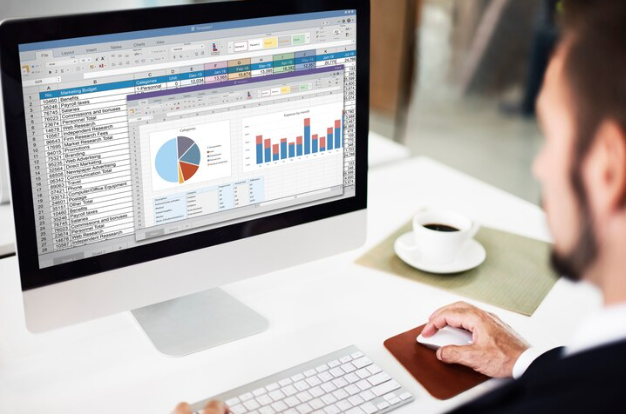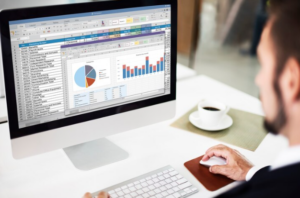microsoft accounting software- In the fast-paced world of modern business, managing finances efficiently is crucial for sustainable growth. Accounting software plays a pivotal role in helping organizations streamline financial operations, maintain accurate records, and make informed financial decisions. Microsoft, a global tech giant, offers several accounting software solutions tailored to businesses of all sizes. In this comprehensive guide, we will explore Microsoft’s accounting software offerings, delve into their key features, understand the benefits they bring to businesses, and explore their role in the broader landscape of financial management.
Understanding Accounting Software
The Significance of Accounting Software
Accounting software, often referred to as financial software or bookkeeping software, is a specialized application that assists businesses in recording and managing their financial transactions. It simplifies various accounting processes, including invoicing, expense tracking, payroll management, and financial reporting. Using accounting software not only enhances efficiency but also reduces the risk of errors in financial records.
The Role of Accounting Software in Modern Business
Modern businesses, regardless of their size, require a comprehensive financial management system to thrive. Accounting software goes beyond simple bookkeeping; it provides tools for financial analysis, reporting, compliance, and decision-making. As a result, businesses can keep a close eye on their financial health, comply with tax regulations, and optimize their financial processes.
Microsoft Accounting Software Offerings
Microsoft offers a range of accounting software solutions, each tailored to specific business needs. Let’s explore some of the key offerings:
Microsoft Dynamics 365 Business Central
Key Features:
- Comprehensive financial management, including general ledger, accounts payable, and accounts receivable.
- Inventory and supply chain management for efficient operations.
- Human resources and payroll management.
- Customer relationship management (CRM) for maintaining strong customer relationships.
- Advanced reporting and analytics tools.
- Integration with Microsoft 365 and other Microsoft products.
Specialization: Microsoft Dynamics 365 Business Central is a versatile solution suitable for small and mid-sized businesses. It offers an all-in-one approach, covering financial management, supply chain, HR, CRM, and more.
Microsoft Dynamics GP
Key Features:
- Financial management with budgeting and real-time reporting.
- Comprehensive supply chain management for procurement, inventory, and order processing.
- Payroll and human resources management.
- Robust business intelligence and reporting tools.
- Integration with Microsoft products, such as Office 365.
Specialization: Microsoft Dynamics GP is designed for small and mid-sized businesses seeking an integrated financial management solution. It focuses on financials, supply chain, and HR processes.
Microsoft Dynamics 365 Finance and Operations
Key Features:
- Advanced financial management with real-time data access.
- Supply chain management, including procurement and inventory control.
- Manufacturing execution and quality control.
- Integration with Microsoft 365 and other Microsoft products.
Specialization: Microsoft Dynamics 365 Finance and Operations is tailored for larger businesses and enterprises. It offers robust financial management and supply chain solutions with a focus on scalability and customization.
Microsoft Dynamics NAV
Key Features:
- Financial management, including general ledger and cash flow forecasting.
- Inventory management for efficient supply chain operations.
- Human resources and payroll management.
- Integration with Microsoft products.
- Customization and scalability for specific business needs.
Specialization: Microsoft Dynamics NAV is suitable for small and mid-sized businesses that require adaptable financial and supply chain management. It offers flexibility and customization to meet unique business requirements.
Microsoft Excel
Key Features:
- A versatile spreadsheet application with powerful financial functions.
- Extensive financial templates for budgeting, forecasting, and analysis.
- Integration with other Microsoft Office applications.
- Real-time data analysis using functions and add-ins.
Specialization: Microsoft Excel is a widely used tool for financial modeling, analysis, and reporting. It’s valuable for businesses of all sizes, especially for ad-hoc financial tasks and data analysis.
Benefits of Microsoft Accounting Software
How Microsoft’s Solutions Benefit Businesses
Microsoft’s accounting software offerings come with several advantages for businesses:
- Efficiency: Microsoft accounting software streamlines financial processes, reducing manual tasks, and providing real-time data, ultimately saving time and resources.
- Data-Driven Decision-Making: Access to real-time data and advanced reporting tools empowers organizations to make better-informed financial decisions, helping them react quickly to market changes.
- Scalability: Microsoft’s solutions cater to businesses of varying sizes. From small startups to large enterprises, these solutions can be adapted to specific requirements and grow with the business.
- Integration: Microsoft accounting software seamlessly integrates with other Microsoft products, offering a cohesive digital ecosystem for businesses that rely on Microsoft’s suite of tools.
- Customization: Many of Microsoft’s solutions offer customization features to meet specific business needs, ensuring that the software aligns with the unique financial processes of an organization.
- Compliance: Microsoft’s accounting software solutions provide tools for maintaining compliance with financial regulations and industry-specific standards, reducing the risk of non-compliance.
Implementation Considerations
Factors to Consider When Implementing Microsoft Accounting Software
Implementing accounting software is a critical decision that requires careful consideration. Here are key factors to keep in mind:
- Business Size: Choose a Microsoft accounting software solution that suits your business size, whether it’s a small startup, a mid-sized enterprise, or a large corporation.
- Integration: Evaluate how well the accounting software integrates with your existing systems and whether it aligns with your digital ecosystem.
- Customization: Consider the level of customization that the accounting software allows to ensure it meets your specific business needs and financial processes.
- Training and Support: Plan for comprehensive user training to ensure that your team can effectively use the accounting software. Additionally, decide whether you will rely on in-house IT staff or engage Microsoft partners for ongoing support and maintenance.
- Data Migration: Develop a data migration strategy to transition data from existing systems to the new accounting software with minimal disruption.
- Security and Compliance: Ensure that the accounting software meets security and compliance requirements, especially if your business handles sensitive financial data.
Real-World Applications
How Businesses Leverage Microsoft Accounting Software
Microsoft’s accounting software solutions find applications in various industries and business functions. Here are some real-world scenarios:
- Retail: Retail businesses use Microsoft accounting software to manage financial operations, track inventory, and analyze sales data.
- Manufacturing: Manufacturers employ Microsoft accounting software to control production costs, manage supply chains, and maintain financial accuracy.
- Professional Services: Consulting and legal firms use Microsoft’s solutions for accurate time and expense tracking, payroll management, and budget control.
- Distribution: Wholesale distributors leverage Microsoft accounting software to streamline inventory management, order fulfillment, and procurement processes.
- Nonprofits: Nonprofit organizations rely on Microsoft accounting software to maintain transparency in financial operations, manage donations, and ensure compliance with grant requirements.
- Healthcare: Healthcare providers use Microsoft’s financial management tools to control costs, track billing, and maintain compliance with healthcare regulations.
Future Trends and Challenges
The Evolving Landscape of Accounting Software
As technology continues to advance, the landscape of accounting software is evolving. Here are some future trends and challenges to consider:
- Cloud-Based Solutions: The adoption of cloud-based accounting software is on the rise, offering scalability, accessibility, and cost-effectiveness.
- Artificial Intelligence (AI) and Machine Learning (ML): The integration of AI and ML in accounting software enables automation of routine tasks, data analysis, and predictive financial modeling.
- Blockchain Integration: Blockchain technology is gradually making its way into accounting software, providing secure and transparent transaction records.
- Data Security: Data security remains a challenge, and businesses must invest in robust cybersecurity measures to protect their sensitive financial data.
- Mobility: The demand for mobile access to accounting software is growing, with businesses seeking mobile apps and responsive interfaces.
- Sustainability: In response to the growing focus on sustainability and environmental responsibility, accounting software may incorporate features to help organizations track and reduce their carbon footprint.
Conclusion
Microsoft’s accounting software solutions play a crucial role in helping businesses efficiently manage their finances, make informed financial decisions, and comply with regulations. With a range of offerings designed for businesses of all sizes, Microsoft accounting software provides scalability, customization, and integration with other Microsoft products. As technology continues to advance, Microsoft’s role in shaping the future of financial management is set to become even more profound, solidifying its position as a leader in the accounting software landscape. Whether you’re a startup, a mid-sized enterprise, or a large corporation, Microsoft’s accounting software offerings can streamline your financial operations and help you make data-driven financial decisions for long-term success.

